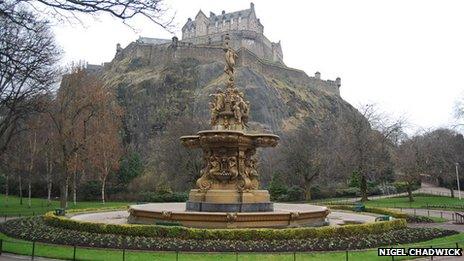Crown Estate announces reforms
- Published

The Crown Estate will give up control of parts of West Princes Street Gardens
The Crown Estate, which controls half of Scotland's coast and almost all of its seabed, is giving away some fishing rights and releasing land in Edinburgh.
The move follows a strongly critical report from the Scottish Affairs Committee at Westminster.
The body will transfer the right to fish for wild oysters and mussels in Scotland to "suitable bodies".
It will also give up control of strips of land at West Princes Street Gardens in the capital.
The select committee reported in March that the Crown Estate lacked accountability and transparency, and that its powers should be devolved to local communities.
However, the UK government said in a formal response that while it recognised the committee's concerns, it was "not persuaded" that the proposals for devolution would offer the best solution.
Scottish assets
The Crown Estate, which owns the rights to the sites of fish farms, renewable energy developments, ports and marinas, said it was changing its operations in Scotland as part of an overhaul of its approach to property management.
The body also stressed the degree to which its Scottish assets will be run from its Edinburgh headquarters.
It is to formalise the role of the Scottish Commissioner, who will chair a newly-established Scottish management board and take a lead role across all activities in Scotland.
In addition, two new senior operational roles with Scotland-wide responsibility have been created to lead operations in Scotland from Edinburgh.
The Crown Estate's Scottish Commissioner, Gareth Baird, said: "We are serious about changing the way we do business in Scotland and the reforms we are announcing today acknowledge that we could have been more responsive to local communities in the past.
"They will ensure that in addition to delivering new inward investment, business and job opportunities in Scotland, our energy, rural and coastal businesses will be able to respond more effectively to the Scottish communities in which they operate."
'Not persuaded'
In a formal response to the Scottish Affairs Committee report on the Crown Estate, the UK government said it recognised its concerns over the body's accountability and transparency in relation to communities in Scotland.
But it added it was "not persuaded" that the committee's proposals for devolution would offer the best solution.
It argued it was important to preserve "the substantial body of specialised expertise in offshore renewables which the Crown Estate has accumulated".
"After careful consideration, the government has concluded that there are strengths in the existing arrangements which should be retained as a matter of public interest," the government said.
"For instance the Crown Estate's unified management framework provides an incentive to investment in offshore renewable energy."
'Missed opportunity'
Scottish ministers described the developments as a missed opportunity by the UK government for "much needed accountability" of the Crown Estate.
Rural Affairs Secretary Richard Lochhead said: "These developments do not go far enough and greater transparency is needed over all Crown Estate functions in Scotland."
Mr Lochhead said the changes were "a small step forward, but it must not be the end of the story".
He added: "Scotland deserves better than a limited and reluctant release of the Crown Estate assets from centralised London control.
"Rather than being determined to hold on to the Crown Estate at any cost, the UK government should relinquish responsibility and devolve control to the Scottish Parliament and Scotland's communities."
The estate is owned by the Crown and managed by an independent board known as the Crown Estate Commissioners.
The estate's revenues do not belong to the monarch and surplus revenue from its £7bn-worth of business is paid each year to the Treasury for the benefit of all UK taxpayers.
- Published19 March 2012
- Published9 February 2012
- Published14 December 2011
- Published7 July 2011
- Published15 September 2011